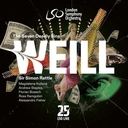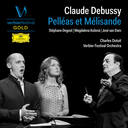BERLIN — Magdalena Kozena, one of today's most versatile mezzo-sopranos, has never chosen a predictable path.
With her flair for Baroque music, flexible voice and striking looks, she won comparisons to the Italian diva Ceclia Bartoli shortly after she signed with the Deutsche Grammophon label in 1999, yet she quickly proved herself an equally coveted interpreter of Romantic music, championing Czech composers such as Janacek and Martinu along with a French repertoire.
"A lot of singers have a few roles that they do fantastically and sing them at all the big houses," says Kozena, 38, at a cafe in the leafy suburb of Zehlendorf where she lives in Berlin. "This wouldn't be something for me. I like to prepare my own programs and be a part of the creative process."
Her new album "Love and Longing," recorded with her husband, Simon Rattle, and the Berlin Philharmonic, travels through Dvorak's "Biblical Songs," Ravel's "Sheherazade" and Mahler's "Rückert Lieder." On Thursday to Sunday, just after the disc makes its release, Kozena will sing the Mahler with the Los Angeles Philharmonic, conducted by Rattle, at Walt Disney Concert Hall. It will be her first performance with the philharmonic. She returns to the songs in a subsequent European recital tour through Perugia, Prague, London and Rotterdam.
For Kozena, who has sung from Mahler's early symphonies, "Das Lied von der Erde," and, on a recent recording with the conductor Pierre Boulez, the "Knaben Wunderhorn" cycle," the "Rückert Lieder" demand a great deal degree of emotional maturity. "You must have a certain amount of life experience to sing them, and it must come from the bottom of your heart," the Czech native explains.
The song collection based on texts by the early 19th century poet Friedrich Rückert varies from the resigned "Ich bin der Welt abhanden gekommen" (I am Lost to the World) to what Kozena considers Mahler's only love song, "Liebst du um Schönheit" (Do You Love for Beauty), written for his notoriously seductive wife, Alma. Kozena recounts a story that the composer hid the song in Alma's score of Wagner's "Walküre," hoping that she would stumble upon it as a love letter.
"When you can't have something, the emotions are even stronger," Kozena says, acknowledging that even though the title for her new album was chosen in part for its universal appeal, the program lingers around this yearning.
She notes that though Ravel is rumored to have never had an amorous liaison, "Sheherazade" is one of the most erotic pieces ever written. Dvorak's "Biblical Songs," while stylistically a world away, were written less than 10 years previously, in 1894, and reflect the composer's homesickness during his tenure in the U.S. Kozena mentions that he found inspiration in gospel music for the psalm settings in his native Czech and a return to simple harmonic language.
The singer considers it a privilege to make a solo recording with her husband's orchestra, the Berlin Philharmonic, which she calls "120 soloists who happen to play together." She recently joined the orchestra in its final season at the Salzburg Easter Festival for her first fully staged "Carmen," having turned down the title role several times. The director, Aletta Collins, is originally a choreographer and coached Ko¿ená in authentic Spanish body language.
"In a revival production there is often no time to work like this," Kozena explains. "That's why I waited to have the conditions I wanted." She and Rattle also concurred about a lighter approach to Bizet's opera that would be more in keeping with the tradition of opéra comique than the popular Italianate aesthetic.
Offstage, the couple is consumed less by professional affairs than spending time with their two boys, ages 7 and 4. The elder, Jonas, plays piano and will join a choir next year. "We'll see if he really gets the fire for it," she says.
© Rebecca Schmid



